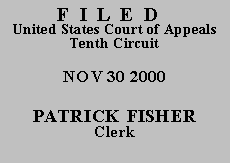

| WILLIE LEE NICKLEBERRY, JR.,
v.
GLYNN BOOHER |
|
Before BRORBY, KELLY, and
MURPHY, Circuit Judges.
After examining the briefs and appellate record, this panel has determined
unanimously that oral argument would not materially assist the determination of
this appeal. See Fed. R. App. P. 34(a)(2); 10th Cir. R. 34.1(G). The case is
therefore ordered submitted without oral argument.
Appellant, Willie Lee Nickleberry, Jr., a state inmate appearing pro se, appeals the district court's decision denying his habeas petition filed pursuant to 28 U.S.C. § 2254. We deny Mr. Nickleberry's request for a certificate of appealability and to proceed in forma pauperis, and dismiss his appeal.
In his federal habeas petition, Mr. Nickleberry challenged his Oklahoma convictions of one count of larceny of merchandise from a retailer after two or more felonies, and one count of assault and battery. As grounds supporting his petition, Mr. Nickleberry contended the state trial court violated his constitutional rights by: 1) restricting cross-examination of a witness, for impeachment purposes, concerning the value of the stolen item, and 2) failing to properly respond to a jury question without notifying defense counsel. The district court referred the matter to a magistrate judge who issued a carefully written and thorough Report and Recommendation, discussing the surrounding circumstances and merits of Mr. Nickleberry's claims and recommending his petition be denied. In so doing, the magistrate judge determined Mr. Nickleberry failed to demonstrate the Oklahoma court's resolution of these claims was contrary to, or an unreasonable application of, clearly established federal law, or involved an unreasonable factual determination.
Mr. Nickleberry filed an objection to the Report and Recommendation, and for the first time claimed the trial court erred in enhancing his sentence based on his prior convictions. After considering Mr. Nickleberry's objections, the district court adopted the magistrate judge's Report and Recommendation, but directed the magistrate judge to consider Mr. Nickleberry's newly raised sentence enhancement claim. At the district court's direction, the magistrate judge issued a cogent Supplemental Report and Recommendation, explaining Mr. Nickleberry failed to exhaust his sentence enhancement claim in the state courts. The magistrate judge nevertheless decided to address Mr. Nickleberry's sentence enhancement claim on the merits. In rejecting his claim, the magistrate judge concluded: (1) application of Oklahoma's habitual criminal enhancement statute to Mr. Nickleberry's sentence raised a matter of state law, and (2) Mr. Nickleberry failed to show the sentence imposed was outside the possible range of punishment provided by statute. The magistrate judge then recommended Mr. Nickleberry's habeas petition be denied in its entirety. Accordingly, the district court adopted the Supplemental Report and Recommendation and denied Mr. Nickleberry's habeas petition.
On appeal, Mr. Nickleberry raises the same claims addressed by the magistrate judge and district court. He also claims his petition raises issues debatable among jurists because two state appellate court judges dissented with the majority in ruling on his direct appeal.
When reviewing the denial of a § 2254 petition, we review the district court factual findings for clear error and its legal rulings de novo. See Rogers v. Gibson, 173 F.3d 1278, 1282 (10th Cir. 1999), cert. denied, 120 S. Ct. 944 (2000). Applying this standard and after a careful review of the record, we agree with the thorough and well-reasoned assessment of Mr. Nickleberry's claims in the magistrate judge's February 29, 2000 Report and Recommendation, and May 31, 2000 Supplemental Report and Recommendation. For that reason, we decline to duplicate the same analysis.
In addition, we reject Mr. Nickleberry's claim his petition raises issues debatable among jurists because two state appellate court judges dissented from the majority, which affirmed Mr. Nickleberry's convictions on direct appeal. In this case, the issue is not whether the state's appellate justices actually disagreed on the underlying merits of Mr. Nickleberry's direct appeal, but whether reasonable jurists would debate whether the state court's adjudication
(1) resulted in a decision that was contrary to, or involved an unreasonable application of, clearly established Federal law, as determined by the Supreme Court of the United States; or (2) resulted in a decision that was based on an unreasonable determination of the facts in light of the evidence presented in the State court proceeding.
See Herrera v. Lemaster, 225 F.3d 1176, 1178 (10th Cir. 2000) (quoting 28 U.S.C. § 2254(d) (Supp. III 1997)). Applying this criteria, we conclude Mr. Nickleberry fails to "demonstrate that jurists of reason would find the district court's assessment of the constitutional issues debatable or wrong." Slack v. McDaniel, 529 U.S. 473, ___, 120 S. Ct. 1595, 1604 (2000). In other words, Mr. Nickleberry fails "to demonstrate that reasonable jurists could debate whether ... the petition should have been resolved in a different matter or that the issues presented were adequate to deserve encouragement to proceed further." Tillman v. Cook, 215 F.3d 1116, 1133 (10th Cir.) (quotation marks and alterations omitted) (rejecting similar contention by petitioner in which individual state court justices dissented in different proceedings on different issues, but the majority nevertheless affirmed petitioner's conviction and sentence), petition for cert. filed, (U.S. Sept. 13, 2000) (No. 00-6580). Thus, we conclude Mr. Nickleberry fails to make the substantial showing of the denial of a constitutional right required for a certificate of appealability. See 28 U.S.C. § 2253(c)(2).
Based on this reasoning, and for substantially the same reasons set forth in the district court's April 20, 2000 and June 19, 2000 Orders, and the magistrate judge's February 29, 2000 Report and Recommendation, and May 31, 2000 Supplemental Report and Recommendation, we deny Mr. Nickleberry's motion for a certificate of appealability, deny his motion to proceed in forma pauperis, and DISMISS his appeal.
Entered by the Court:
WADE BRORBY
United States Circuit Judge
*. This order and judgment is not binding precedent except under the doctrines of law of the case, res judicata and collateral estoppel. The court generally disfavors the citation of orders and judgments; nevertheless, an order and judgment may be cited under the terms and conditions of 10th Cir. R. 36.3.